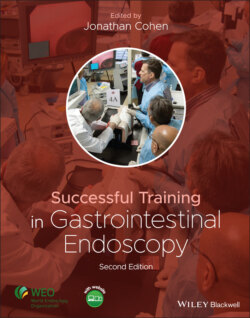Читать книгу Successful Training in Gastrointestinal Endoscopy - Группа авторов - Страница 65
Introduction
ОглавлениеEndoscopic training programs strive to develop individuals capable of providing safe, efficient, and effective endoscopic care and meeting the rapidly changing service demands. This requires training in not only technical skills but also cognitive and nontechnical skills essential for clinical practice. In recent years, endoscopic training has begun to evolve from a traditionally experiential model of learning, in which individuals “learn by doing,” to a more structured approach grounded in evidence‐based educational principles [1–3]. It is increasingly recognized that effective endoscopic training requires preparation and structure, and should be provided by individuals with the requisite skills and behaviors required to teach endoscopy, including an understanding of adult learning principles, knowledge of best practices in procedural skills education and appropriate use of effective educational strategies, such as performance enhancing feedback [4]. In this chapter, we identify the key features of a successful endoscopic training environment, describe attributes of effective endoscopic trainers, outline the Preparation–Training–Wrap‐up framework that describes the essential components of an endoscopic teaching encounter, and finally discuss training aids and resources.
